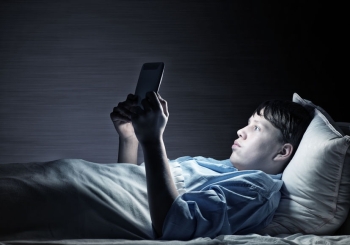
Why a Teenager May Feel Sleep Anxiety: Teenager Therapy in Philadelphia
From time to time, every teenager feels anxious at night. As the day rolls to a close, there’s fewer external events, like school or work, to distract us from the inner workings of our minds. With less distraction, our minds create thoughts to fill up the space, often reflecting on things that happened in the past or planning for events we anticipate in the future.
This habit of mind isn’t a bad thing—it’s exactly what our minds are supposed to do! When we aren’t actively participating in life events, like taking a test or hanging out with friends, our minds make use of the quiet to plan for the future or try to learn from the past, all as a way of keeping us safe and happy. Thanks, mind!
Sometimes, though, especially in the quiet of night, our minds can go into overdrive—creating so many thoughts that it becomes difficult to settle down for bed.
For a teenager who may be dealing with a variety of newly intense life stressors, from grades to social pressures, nights can be an especially anxious period of the day. It might not be until nighttime, when less is going on, that a teenager realizes just how busy their mind is. You may be remembering a conversation you had at school with a crush, wishing you said something different. You could also be thinking about the next day, planning the perfect line you’ll deliver to make your crush swoon.
All those thoughts can make a teenager’s mind anxious at bedtime and can lead to sleep problems, like insomnia. Or even anxiety about having insomnia! Anxiety can be confusing sometimes.
No matter if you’re having trouble sleeping because of your anxiety OR you’re feeling anxiety about having trouble sleeping, this self-help tip is for you!
Manage Your Sleep Anxiety as a Teenager: Teenager Therapy in Philadelphia
The first thing to keep in mind about managing your nighttime anxiety is to optimize your bedtime routine so that it promotes relaxation and healthy sleep hygiene. That’s because the more relaxed you are and the easier it is to fall asleep, the less likely it is you’ll feel anxious at night.
We have written before about how to promote relaxation at night and how to have good sleep hygiene, and I encourage you to check out those self-help tips for more detail.
In summary, the basics of promoting bedtime relaxation and good sleep hygiene include:
Have consistent bedtime and wake up times (on weekdays AND weekends).
Never stay in bed for longer than 20 minutes if you can’t fall asleep. Instead, you should get out of bed and try a non-screen based activity like stretching or reading a physical book.
Avoid caffeine or nicotine within six hours of bedtime.
Only use your bed for sleep.
Don’t take naps during the day.
Try scheduling a later bedtime.
Exercise during the day, at least six hours before bed.
Avoid eating a heavy meal close to bedtime, and try drinking a glass of warm milk before bed.
Try stretching or breathing exercises before bed or while trying to fall asleep.
While all of these ideas will definitely help make bedtime better, none directly address the thoughts themselves that cause bedtime anxiety when you’re a teenager. That’s where cognitive behavioral therapy (CBT) comes in.
Using Cognitive Behavioral Therapy (CBT) to Challenge Your Bedtime Thoughts: Teenager Therapy in Philadelphia
Cognitive behavioral therapy (CBT) is a theory and technique used for treating anxiety that is based on the idea that our thoughts, feelings, and behavior are connected (see diagram below). CBT suggests that if we challenge our thoughts to be more accurate, then we’ll feel better and make better decisions about our behavior.
"File:Depicting basic tenets of CBT.jpg" by Urstadt is licensed under CC BY-SA 3.0
A teenager can use CBT to identify and challenge the thoughts that are causing them anxiety at bedtime so that they feel better and can stick to behaviors that promote healthy bedtime routines and quality sleep.
Here’s an example. Let’s say that 16-year-old Jimmy is feeling anxious or keyed up after he finished his homework and dinner, knowing that he should be getting ready for bed. He feels uneasy but isn’t sure why, so he starts scrolling through TikTok on his phone to distract himself from the unpleasantness of how he’s feeling. The light, sound, and general excitement from TikTok keep him up even later. Now, approaching midnight, Jimmy feels more anxious than before, concerned that he won’t get enough sleep tonight and will consequently have a hard day at school tomorrow.
Sound familiar? Of course it does! We all end up feeling like Jimmy sometimes, so don’t forget to cut yourself some slack. Now, let’s break down how to use CBT to help Jimmy challenge his thoughts, feel better, and sleep well. Note: We provided a handy table below for you to walk yourself through these steps at your convenience.
Nighttime Steps for Managing Sleep Anxiety as Teenager: Teenager Therapy in Philadelphia
First, Jimmy needs to learn how to identify he is feeling anxious to begin with! Our bodies are the best source for that information. Jimmy might recall that after dinner, his palms were sweaty, his heart was racing, that he felt tense, or that it was difficult to focus. These clues from his body indicate to Jimmy that he was feeling an unpleasant emotion.
When he’s feeling this way, Jimmy quickly scribbles down a note in a bedside journal naming his physical symptoms (e.g. “heart racing”). If he’s aware, Jimmy can also write down what he was thinking about or doing before developing those symptoms. (If this part is difficult, don’t worry, Jimmy will spend more time exploring his thoughts tomorrow, when he is feeling less anxious.) When feeling anxious in the moment at night, we recommend you try an activity to promote relaxation instead, like stretching, reading a physical book, or a breathing exercise.
Daytime Steps for Managing Sleep Anxiety as Teenager: Teenager Therapy in Philadelphia
The next day, if he didn’t already identify it, Jimmy needs to ask himself what was making him feel anxious last night (the thought behind the feeling). Anxiety is typically based upon a fear that something bad will happen in the future. Jimmy can ask himself, what was I most afraid of happening in the future? What was my worst fear?
Jimmy identified that he was afraid he wouldn’t be able to fall asleep when he tried to do so, and that being sleep-deprived would cause him to fail his test the next day.
- Next, Jimmy needs to challenge his thought by examining the evidence for it. He made a list of all the reasons why this thought might not be 100% true all of the time. He can ask himself:
Over the past few years, how many times have I actually had trouble sleeping?
Out of all the tests I’ve taken in the past few years, how many times have I actually failed one?
Out of all the tests I’ve taken in the past few years, how many times have I actually failed a test when feeling sleep-deprived?
- Once Jimmy examines the evidence for his original thoughts, he can come up with more accurate, alternate thoughts:
If it’s just a few nights here and there, that’s normal.
If it’s just one or two failed tests out of many, then my chances are actually pretty good!
Again, unless this has happened over and over, there is not enough evidence to show that a rough night of sleep will lead to me failing a test.
Now, to wrap it all up, Jimmy needs to come up with a plan for what he’ll do next time he has these thoughts and feels anxious before bed. He can propose an alternate behavior that promotes relaxation and quiets his mind, setting him up for a restful night of sleep.
Now, try it yourself.
Thought Recorder for Bedtime Anxiety
Because teenagers tend to separate from their parents at this stage of life (which is developmentally appropriate), don’t take it personally if your teenager isn’t interested in trying a cognitive behavioral therapy exercise with you. Often, bringing in a professional teenager therapist can help to break through communication challenges between teenagers and their parents.
If you need more support to help your teenager manage sleep anxiety or other mental health issues, reach out to schedule an appointment with one of our teenager therapists.
In addition to teenager sleep anxiety issues, we also provide teenager therapy for depression, teenager therapy for social anxiety, teenager therapy for loneliness, teenager therapy for body dysmorphia, teenager therapy for eating disorders, teenager therapy for low self-esteem, teenager therapy for loss and grief, teenager therapy for trauma, teenager therapy for sexual orientation and gender identity, and teenager therapy for neurodiversity, including ADHD, aspergers, autism, dyslexia, and tourettes.
You can self schedule an in-person or virtual therapy session at the Center for Growth by calling (215) 922- LOVE (5683) x 100.
Our Guarantee: If after your first session you are not sold that you are working with the right therapist, do not hesitate to call our intake line at 215 922 5683 x 100 or Alex at (267) 324-9564 and ask to be rescheduled with another therapist. The choice of how you want to proceed is yours. Our only goal is to support you in becoming the best you possible.
For your convenience, we have brick and mortar offices and work with clients virtually in Connecticut, Delaware, Florida, New Jersey, New Mexico, Pennsylvania, and Virginia.
Physical Therapy Office Locations:
Ocean City Therapy Office 360 West Ave, Floor 1, Ocean City, NJ 08226
Mechanicsville Therapy Office 9044 Mann Drive, Mechanicsville Virginia, 23116
Society Hill Therapy Office 233 S. 6th Street, C-33, Philadelphia PA 19106
Art Museum / Fairmount Therapy Office 2401 Pennsylvania Ave, Suite 1a2, Philadelphia PA 19130
Providence Therapy Office 173 Waterman St. Providence, RI 02906
Fayetteville Therapy Office 101 Devant Street #606, Fayetteville GA 30214
Santa Fe Therapy Office, 2204 B Brothers Road, Santa Fe, New Mexico, 87505
Telemedicine Therapy Locations: We have therapists who are licensed to work in Connecticut, Delaware, Florida, Georgia, New Jersey, New Mexico, Pennsylvania and Virginia and Pennsylvania
Therapy Services Offered in Fayetteville, Ocean City, Mechanicsville, Philadelphia, Providence, Santa Fe:
Individual Counseling and therapy
Couples Counseling and marriage counseling
Teen Therapy and Adolescent Therapy and tweens and child counseling
Family Therapy and multi-generational counseling
Art Therapy and Counseling no art skills needed
ADHD Therapy and ADD, Dyslexia, Autism, Tourettes counseling
Anxiety, Panic, OCD Therapy and worry and fear support
Breaking the cycle of Codependency and being your own person
Overcoming Chronic Illness and Chronic Pain .
Depression Therapy and sadness, gloom, and upset support
Functional Neurological Disorder (FND) Therapy is a particular style of therapy designed for people with problems affecting their nervous system, how the brain and body send and receive signals.
Grief Therapy and loss, End of A Relationship, rejections, pregnancy and loss and therapy
Mindfulness Based Therapy and spirituality based therapy
Narcissistic Abuse Recovery child of, parent of, spouse of, sibling of a narcissist.
Sex Therapy and sexual function & dysfunction, sex addiction, sexual orientation and gender identity support
Trauma Therapy both emotional and sexual abuse, complex trauma, PTSD counseling
Divorce support
Affairs, Infidelity, Unfaithful, Cheating counseling
Parenting therapy
Personality disorder treatments Narcissist, Borderline, Histrionic
Setting Boundaries and identifying ones own Core Beliefs
Just name some of the Mental Health issues that we work with. Our goal is to help you Change and Achieve Your Dreams


























